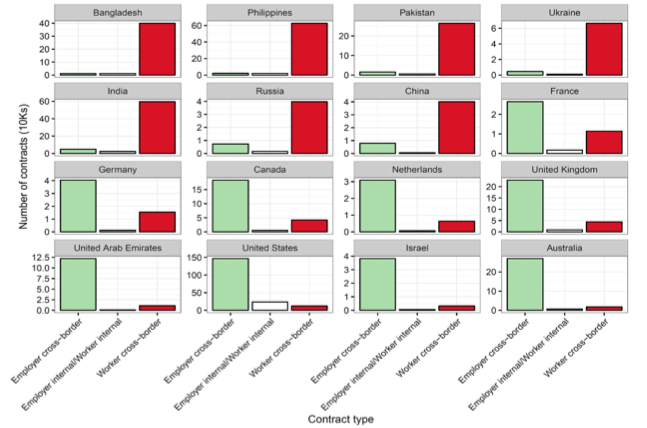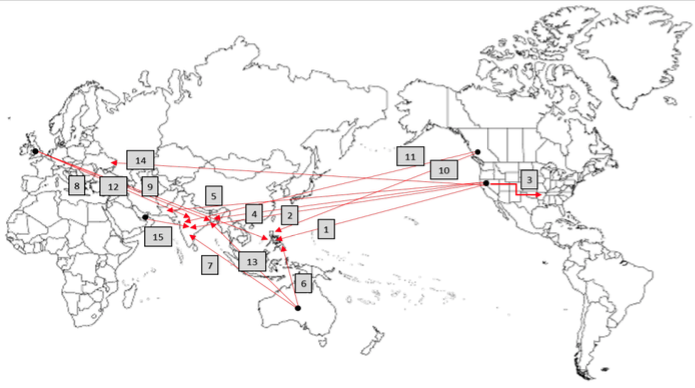Images of the ‘office’ typically depict water cooler chats and stuffy conference rooms, but today 43% of Americans spend at least some time working remotely (New York Times 2017). The workplace is also becoming familiar with a new type of short-term contractor, frequently located half way around the world. In years past, language barriers, time zones, contract management, and so on limited the ability of many firms to contract or outsource work globally. Digital technology, however, is providing solutions to these classic frictions. New online labour platforms such as Upwork (formerly oDesk) or Catalant facilitate interactions between employers and employees for tasks ranging from basic data entry to advanced search engine optimisation. Upwork’s ability to mitigate costs that have traditionally hindered global contracting has led it to become the world’s largest digital labour platform.
The rise of digital labour is facilitating a growing body of research on how these platforms operate and what we can learn about labour markets from their copious data. Even when digital, classic frictions like difficulty in assessing worker quality still arise. Reputation systems can partly address this issue, but coarse information remains problematic (Horton and Golden 2016). New hires remain uncertain for hiring companies, and employers do not internalise the value of generating knowledge about workers in early jobs (Tervio 2009, Pallais 2014). Self-formed agencies of workers have arisen on these sites to partially close information gaps and build reputations for multi-person teams (Stanton and Thomas 2016).
While most of these studies are micro analyses of matching or information frictions, in a recent paper with John Horton we study the macro picture of contract placement (Horton 2018). The paper provides some first evidence regarding flows and substitution across countries on digital labour platforms. We also show that diaspora networks, in particular the Indian diaspora, still matter for how contracts are placed at the global level, similar to Rauch and Trindade’s (2002) classic analysis of the Chinese diaspora and manufacturing trade. These analyses provide insights into the persistent economic and business implications of global talent flows (Kerr 2018).
Starting first with the macro structure of contract flows, Figure 1 shows that placements are frequently cross-border and North-South in nature. This makes sense for employers seeking contractors offering lower wage rates, but it is also quite different from classic trade patterns in products, as we quantify in the paper. Countries also provide very limited services to themselves on digital labour markets, with the US being a major exception.
Figure 1 The asymmetric nature of Upwork global contract flows
Notes: The figure quantifies the number of contracts for selected countries by their cross-border nature. The vertical axis is specific to each country and measured in tens of thousands. The first bar in each triplet captures outbound contracts made by employers in the country to workers in another country. The second bar reflects contracts made by employers to workers in their own country. The third bar measures the contracts completed by workers in the country where the employer is in another country.
Figure 2 shows the top 15 employer-worker contract flows as measured by contract volume through 2014. The arrow points to the location of the worker. For the case No. 3, the third largest flow is the US to itself.
Figure 2 Top employer-worker contract flows on Upwork platform
How sensitive are these patterns to wage changes? We empirically quantify that a 1% increase in average bids from non-US contractors leads to a 4.61% decrease in their contract share. Yet, the cross-elasticities are incredibly tiny: a 1% increase in US bids leads to a 0.039% increase in contract share for the rest of the world. This lack of substitution suggests that frictions are quite persistent. Even in a digital labour market specifically designed to lower switching costs, there is very little substitution between the US and other countries. Instead, it appears employers leave the platform in response to wage bid increases rather than substitute away from their target search location.
We next examine the role of ethnic Indian networks on digital outsourcing patterns. Ethnic networks have been important for trade patterns since the Phonecians, but would they still matter on a digital platform? We use the names of individuals listed as company contacts to probabilistically assign ethnicities. Individuals with surnames like Chatterjee or Patel are significantly more likely to be ethnically Indian than individuals with surnames like Wang, Martinez, or Johnson. Our match rate is 88%. The company contact is the individual within each firm that hires and pays for the service, which is crucial for evaluating the role of ethnic connections in digital hiring choices.
We show in the paper how the Eaton and Kortum (2002) model provides a natural conceptual link for using a gravity trade framework to study digital labour flows. Ethnic networks still matter despite the digital environment: a 1% increase in the Indian diaspora share of a country is associated with a 1% increase in the share of oDesk contracts outsourced to India. The country-level placement of digital contracts in India systematically follows the pre-existing levels of Indian diaspora communities.
This macro work complements our work at the micro level with Ejaz Ghani (Ghani et al. 2014). This prior study emphasises persistence in employer choices: once an employer starts to contract with a country, it is less likely to explore other options unless it has a bad experience. Ethnic Indian employers are more likely to try India at the outset than employers of other ethnicities, and this appears to be largely due to taste-based reasons. The alignment of the micro- and macro-level approaches helps illuminate how digital labour markets operate and their overall consequences.
These findings also have important managerial consequences. The initial biases of managers can result in imperfect long-term arrangements, as path dependence and contentment with the status quo produce inertia in further experimentation. As online markets increase competition – in Upwork’s case by breaking down the strong spatial partitions that have traditionally existed with labour markets – these biases may hurt firm performance in significant ways. Innovation and entrepreneurship will be particularly sensitive to these pressures given the high potential for outsourcing technical and scientific work and the globalisation of this field’s labour force
References
Chokski, N (2017), “Out of the Office: More People Are Working Remotely, Survey Finds,” The New York Times, 15 February.
Eaton, J, and S Kortum (2002), “Technology, Geography, and Trade,” Econometrica 70(5): 1741-1779.
Ghani, E, W Kerr, and C Stanton (2014), “Diasporas and Outsourcing: Evidence from oDesk and India,” Management Science 60(7): 1677-1697.
Horton, J, and J Golden (2016), “Reputation Inflation in an Online Marketplace,” Working Paper.
Horton, J, W Kerr, and C Stanton (2018), “Digital Labor Markets and Global Talent Flows,” in G Hanson, W Kerr and S Turner (eds), High-Skilled Migration to the United States and its Economic Consequences, University of Chicago Press: 71-108.
Kerr, W (2018), The Gift of Global Talent: How Migration Shapes Business, Economy & Society, Stanford University Press.
Pallais, A (2014), “Inefficient Hiring in Entry-Level Labor Markets,” American Economic Review 104(11): 3565-3599.
Rauch, J, and V Trindade (2002), “Ethnic Chinese Networks in International Trade,” Review of Economics and Statistics 84(1):116-130.
Stanton, C, and C Thomas (2016), “Landing the First Job: The Value of Intermediaries in Online Hiring,” Review of Economic Studies 83(2): 810-854.
Tervio, M (2009), “Superstars and Mediocrities: Market Failure in the Discovery of Talent,” Review of Economic Studies 76(2): 829-850.





